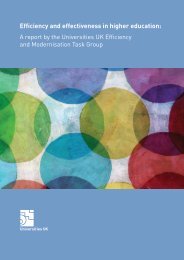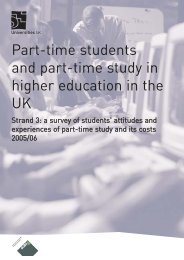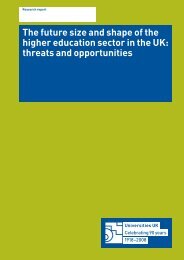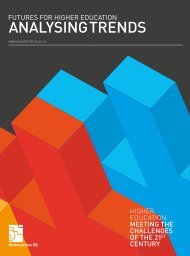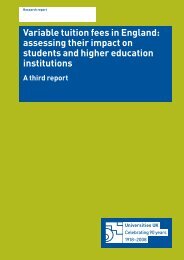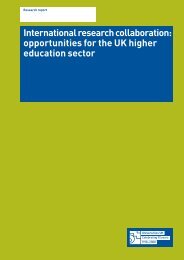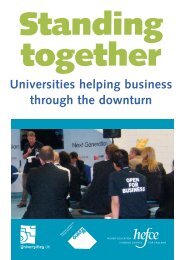The future of research - Universities UK
The future of research - Universities UK
The future of research - Universities UK
You also want an ePaper? Increase the reach of your titles
YUMPU automatically turns print PDFs into web optimized ePapers that Google loves.
13<br />
q<br />
5. <strong>The</strong> <strong>UK</strong>’s only<br />
dedicated soil science<br />
department at the<br />
University <strong>of</strong> Reading<br />
aims to develop an<br />
understanding <strong>of</strong> soil<br />
within the earth’s systems<br />
using field <strong>research</strong>,<br />
laboratory experiments<br />
and modelling<br />
techniques.<br />
<strong>Universities</strong> <strong>UK</strong> – <strong>The</strong> <strong>future</strong> <strong>of</strong> <strong>research</strong><br />
Research quantity and quality<br />
Excellent <strong>research</strong> is expensive, but poor <strong>research</strong> is worthless. <strong>The</strong>re are<br />
concerns that the <strong>UK</strong> system tries to do too much <strong>research</strong>, that the dispersion<br />
<strong>of</strong> resources across institutions is unbalanced, and that new arrangements are<br />
needed to support costly national and international facilities. A national reflection<br />
is required about the use <strong>of</strong> <strong>research</strong> resources.<br />
<strong>UK</strong> university <strong>research</strong> is characterised by a highly selfmotivated<br />
culture, without which quality and effectiveness could not arise. In<br />
the absence <strong>of</strong> alternative objectives formalised by management, a common<br />
tendency in the <strong>research</strong> enterprise has been to prioritise growth. More activity<br />
– postgraduates, contracts and publications – has been valued ahead <strong>of</strong> more<br />
support for the best activity.<br />
Between 2000–07, <strong>research</strong>er numbers in the higher education<br />
<strong>research</strong> base increased by approximately 85 per cent. <strong>The</strong> volume <strong>of</strong> <strong>UK</strong><br />
publications increased by approximately 50 per cent over the same period and<br />
<strong>UK</strong> <strong>research</strong> impact also improved – but only marginally against world average.<br />
Average world impact also increased, but it is nonetheless disappointing that<br />
such an increase in <strong>research</strong> capacity did not improve the <strong>UK</strong>’s position. Research<br />
resources rose but so also did unit costs. Recent Transparent Approach to Costing<br />
(TRAC) data shows that despite the introduction <strong>of</strong> full economic costing (fEC) there<br />
remains a £2 billion deficit for <strong>research</strong>. Some <strong>of</strong> this may be down to problems<br />
with TRAC, and fEC is still ‘work in progress’, but the residual deficit is cause for<br />
concern. It is therefore a question as to what benefit accrues from a plethora <strong>of</strong><br />
badly-funded <strong>research</strong>ers?





